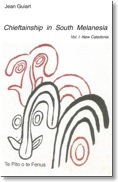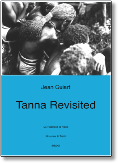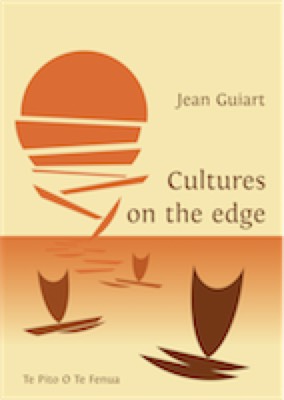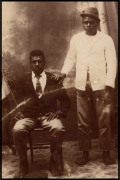
Written articles
Misconceptions: The South Pacific has been a laboratory for social anthropologists for the best of a century. Theoreticians have come and gone, but the field still yields rich data and as ever raises questions on...
The unsung reality behind the oft: Wayward actions of the official colonial structure inside New Caledonia...
Chiefs and what they are: A criticism of some aspects of archeological reconstructions of the Pacific Island’s past...
Questions and answers in Pacific Art: The collected object in between strictly ethnographical criteria and the aesthetic viewpoint...
Derek Freeman versus Margaret Mead: Jean Guiart’s answer to Paul Shankman in The Thrashing of Margaret Mead, Anatomy of an Anthropological Controversy, The University of Wisconsin Press
Article written by Jean Louis Rallu, Research Director, retired from INED: Jean Guiart: Methodology, Fieldworker, Debates and Politics in Ethnology
Biography
Jean Guiart was born in 1925 in Lyon and died in 2019 on the island of Tahiti. He was a french anthropologist. He was directeur d'études at the École Pratique des Hautes Etudes (EPHE) and from 1973 to 1988 head of the Laboratoire d'ethnologie du Musée de l'Homme in Paris.
Since his retirement, he lived in Tahiti (French Polynesia) and Noumea (New Caledonia), where he founded in 1997 his publishing company Rocher-à-la-Voile.
His research interests were the arts and religions of Oceania, particularly New Caledonia and Vanuatu (formerly New Hebrides). He made an important contribution to the studies of Kanak society.
Books for free download
We offer the books mentioned on this page for free download as a PDF file if you send us request. Please enter your name and address and the title of the book you wish to download by clicking here. We will send you the download link by email.
Chieftainship in South Melanesia Vol 1 & 2
More or less everything cultural has found its way inside these two volumes, as regards New-Caledonia proper and the Loyalty Islands, in all sorts of ways which will be discovered through reading, page after page, what wishes to be considered as rich if not in theory (I am very careful at this level), at least in detail of the data, in the strong details which make the real value of a book in anthropology (each theory being brushed off by the next generation).
The experience of the last decades has shown the value of this text for the people, and the amount of young people asking for it, because they inevitably find their family lore inside. I had only been the scribe of their forefathers and only put in form what they had decided to tell me, for all sorts of good or bad reasons, acccording to the status of the viewer and the viewed inside the colonial set up. I was the only French civil servant trained and employed to know all that there was to learn about the island people.
Ask for download linkTanna revisited
This work on Tanna has been the best received in all of Professor Jean Guiart’s professional career. His experience in New Caledonia and the Loyalty islands, on Ambrym and Malekula, allowed him to work quickly and efficiently; all the time in the day being taken by field work, sleeping in the open and eating what was brought to him by the people. He never required anything from them and let them act on their own.
This work had been asked from him by the two Resident Commissioners, in what has become Vanuatu, the French and the British, after a bout of the millenarian movement known under the name of John Frum, the one who would «broom» the white man away. The method chosen by the author, carefully refined through his previous experiences, was to establish a kind of public workshop in each village, everybody being present, particularly the women, whose presence was needed to compensate the men’s at times insufficient memory and to prevent them from bringing in the situation too much imagination.
Ask for download linkCultures on the edge
Caught between the White Man's concepts of Polynesia opposed to Melanesia. From Efate to Epi, Central Vanuatu
A wrong idea has reigned for two centuries on Oceanic studies, the one that Polynesian island civilisations were superior to the ones of the Melanesian islands, dominated by barbaric customs, where neighbour tribes were the enemies of one another, cruel chiefs’ and sorcerers’ will was supreme, and cannibalism the law.
But mostly, they were the same people as the Melanesians, eating the same foods (taro and yams brought from Asia, bananas, sugar cane and breadfruit created on the spot), building their housing with the same materials, cultivating the same crops, the same fruit trees and tiare flowers, having recourse to the same medicinal plants (brought from South Asia), fishing in exactly the same way and dealing inidentical fashion with the hurdles of everyday life.
From the Santa Cruz islands to northern Vanuatu, the longest journey is two days from Tikopia to the isolated island of Vatganay, where the crew stops to cook and clean the garden of coconut trees and taro for the next visitors. Then they change course so as to make land on one of the central islands of the Banks group and later go to Mota Lava, where there is a marriage between Tikopia and this island at each generation.
Jean Guiart shows here how the people of South Central Vanuatu, from the islands of Efate to Epi, are the real direct ancestors of the Western Polynesians.
Ask for download linkRacrac CHARLEY (SALE): Gooday Master Dellegation Condominium N - H
Presentation of the book by Jean Louis Rallu
The title of this book is taken from the first words of the first text to reach us from Racrac Charley: a letter to the Delegate - as he usually calls the District Agent. We chose it because it is an integral part of the texts left by the author and reflects the central subject of his writings: the difficult dialogue between Melanesians and Europeans. The term dialogue must be understood in a broad sense, covering the various interactions of the natives with the administration, the missions and the colonists, and also between Melanesians whose daily life was profoundly modified at that time. He never uses the word 'Capman', refusing to be dominated and considered as an inferior human being. It is as a chief (actually a member of a chiefly line) that he is talking with an official of the colonial adminstration...
Link to the total presentation Ask for download link of the book More free books


